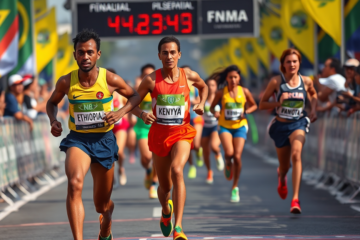Visa Restrictions for Transgender Athletes
Transgender Athletes have faced increasing challenges in their attempts to compete at a professional level, especially in women's competitions.
Recently, the US government announced new restrictions on issuing visas to these athletes, claiming 'security, justice, respect and truth'.
This decision, which includes denying visas to 'male athletes' and putting pressure on the International Olympic Committee, raises crucial questions about discrimination and the integrity of gender policies in sport.
In this article, we will explore the impact of these measures and their implications for future generations of transgender athletes.
Context and Motivation of Visa Restrictions
The US government has announced significant restrictions on issuing visas to transgender athletes who wish to compete in women's competitions, citing security, justice, respect and truth.
This measure, as reported by sources such as the The Globe, emerged amid a strong political and social agenda driven by the current administration.
In response to concerns raised by conservative groups, an executive order was signed that aims to ban transgender women from participating in women's sports and proposes cutting funding to institutions that allow such participation.
This act not only interferes with international sports policies, but also triggers significant tensions within the International Olympic Committee to establish a global ban on trans women, impacting high-profile events such as the 2028 Olympic Games in Los Angeles.
USCIS Policy and Legal Basis
The U.S. Citizenship and Immigration Services (USCIS) has announced a controversial policy that aims to deny visas to athletes who identify as transgender but compete in women's categories.
This decision is supported by an executive order that grounds the action in legislatures seeking to protect the integrity of women's sports competitions, with a strong appeal to the national interest.
The administration claims that this measure is necessary to ensure safety and fairness in competitions, thus encouraging a global review of gender policies in sport.
Deportation Categories and Consequences
O US Citizenship and Immigration Services (USCIS) established specific deportation categories for trans athletes seeking to compete in women's events violating new immigration guidelines.
These categories include violation of gender identity in sports performance, which USCIS cites as an attempt to gain unfair competitive advantages.
Consequently, the agency can apply severe measures, such as summary deportation, to any athlete who violates these rules.
Additionally, those who obtained visas through means deemed fraudulent are subject to additional penalties.
Athletes from outside the US are especially affected, as the risk of deportation and re-entry ban becomes imminent, impacting not only their careers, but also their personal and professional lives.
Pressure on the International Olympic Committee
The US government is stepping up its campaign to pressure the International Olympic Committee (IOC) to institute a global ban on trans women in women's competitions.
According to information released, the US guidelines largely reflect a February 2025 executive order, endorsed by then-President Trump, banning these athletes from participating in events in the country.
The U.S. Citizenship and Immigration Service has established that it will deny visas to athletes who defy this policy, using the pillars of “safety, justice, respect, and truth” as justification.
The US Olympic Guidelines were aligned with this stance, significantly influencing the global debate.
US pressure on the IOC is sending ripples around the world, threatening to create divisions within international sport.
The potential ban could undermine inclusion and equality, fundamental elements of the Olympic spirit, and could intensify political tensions in countries that adopt more inclusive policies..
This complex issue continues to generate heated debates in political and community spheres at the international level.
Impact on the 2028 Olympic Games in Los Angeles
US visa restrictions and the exclusion of transgender athletes bring extra complexity to organizing the 2028 Olympic Games in Los Angeles.
The government's decision to ban visas for transgender athletes calls into question the International Olympic Committee's inclusion and diversity policy. as mentioned here.
The push for a global ban could impact not only athlete participation but also fairness in competition, triggering a series of ethical and moral clashes between athletes, organizers, and sports entities.
The preparation process for the Games also becomes more complicated as organizers look for alternatives to ensure the safety and well-being of all competitors.
Furthermore, the accreditation logistics faces changes, as eligibility standards require a thorough analysis of athletes' gender identities and athletic backgrounds.
This scenario could mean increased scrutiny and extended deadlines for approving or rejecting participants, creating a tense and potentially conflictual environment between international delegations and the U.S. government.
| Impacted Area | Effect |
|---|---|
| Athlete accreditation | Review of eligibility criteria |
| International participation | Reduction of diversity in sports |
Finally, the organizers' attention and efforts are focused on trying to minimize the adverse effects of these restrictive measures to preserve the essence of the Games, which aims to celebrate the union global through sport.
February Executive Order and Funding Cuts
The February executive order in the US has profound implications for sports competitions and institutional funding.
This ruling prohibits trans women from participating in women's competitions, citing concerns about the fairness and integrity of the sport.
Furthermore, it imposes direct threats of funding cuts for organizations that allow such participation, directly impacting the financing and operations of these entities.
The actions were intensified by the USCIS, which aims to restrict the issuance of visas to transgender athletes.
The U.S. Olympic Committee welcomed these guidelines as part of a broader policy.
- Budget cuts can affect the financial stability of many sports organizations.
- USCIS implements visa restrictions for trans athletes, complicating their international participation.
- The order aims to protect what it considers “integrity” in women’s competitions.
- The measures reflect a growing trend of restrictive policies in American states.
- Collaboration with the International Olympic Committee for a global ban is an apparent goal.
For more details, see the article on how the US Olympic Committee is applying this order.
Justification of National Interest
Justification of National Interest: The United States government has implemented a policy of visa restrictions for trans athletes in women's sports, arguing that the measure is in the national interest.
The central claim is that the participation of trans athletes could bring an unfair competitive advantage, damaging the integrity of the competitions.
According to the U.S. Citizenship and Immigration Services, ensuring fairness in competitions is a strategic factor in maintaining balance and ensuring respect for the rules in force in women's sports.
With this decision, the government seeks to close loopholes for those who change their gender identity solely to gain competitive advantages.
However, this policy has also faced criticism from international and human rights organizations who see this measure as a form of discrimination and transphobia.
The impact is amplified as the government pushes the International Olympic Committee to adopt similar measures, especially for high-profile events like the 2028 Olympic Games in Los Angeles.
Thus, the justification of security and justice seems to resonate more as an effort at control and exclusion, highlighting the tensions between sports security and gender rights.
Recent visa restrictions for transgender athletes highlight a worrying scenario of discrimination in sport.
As the 2028 Olympics approach, the debate over inclusion and fairness in women's competitions remains a central issue.



0 Comments